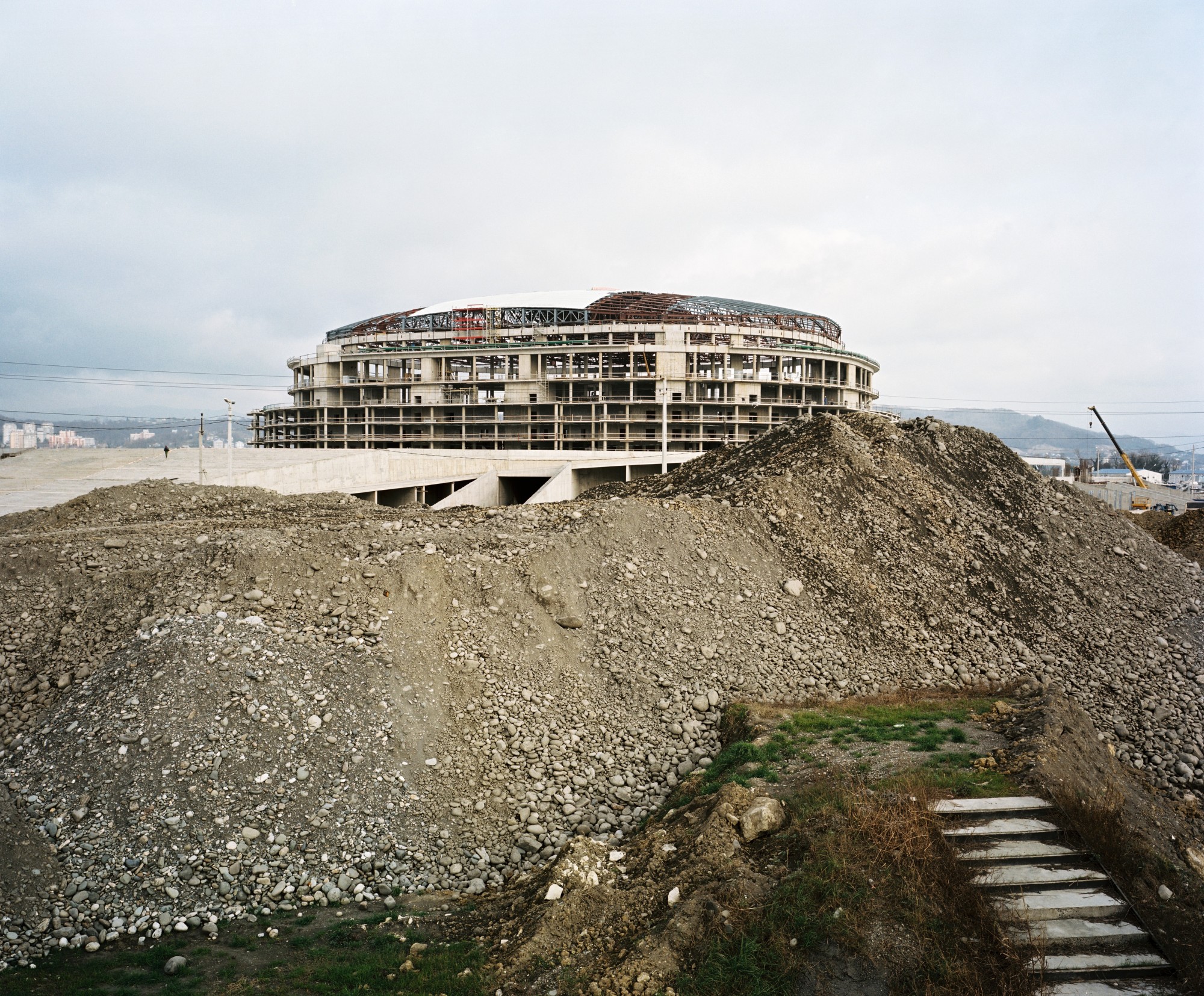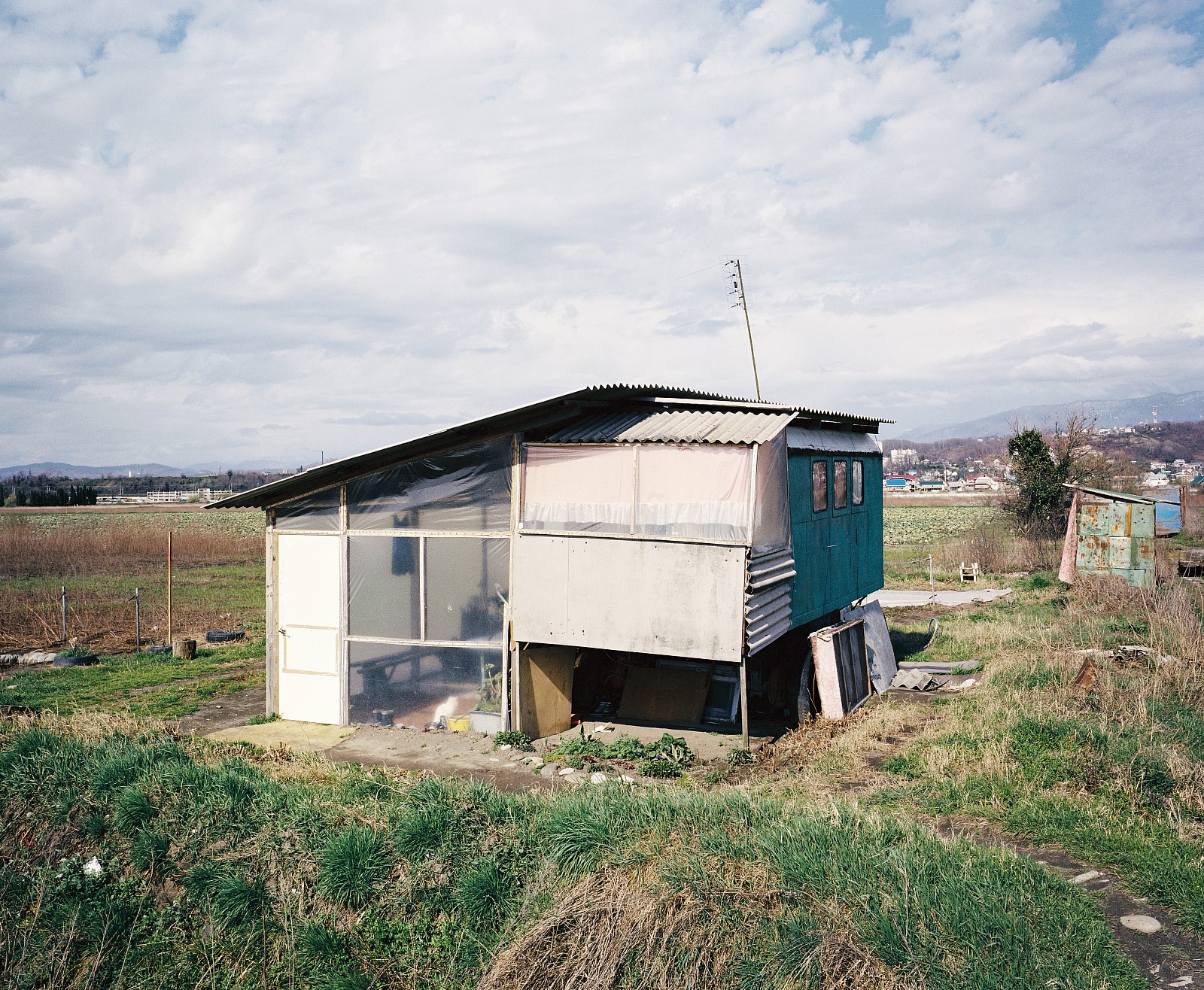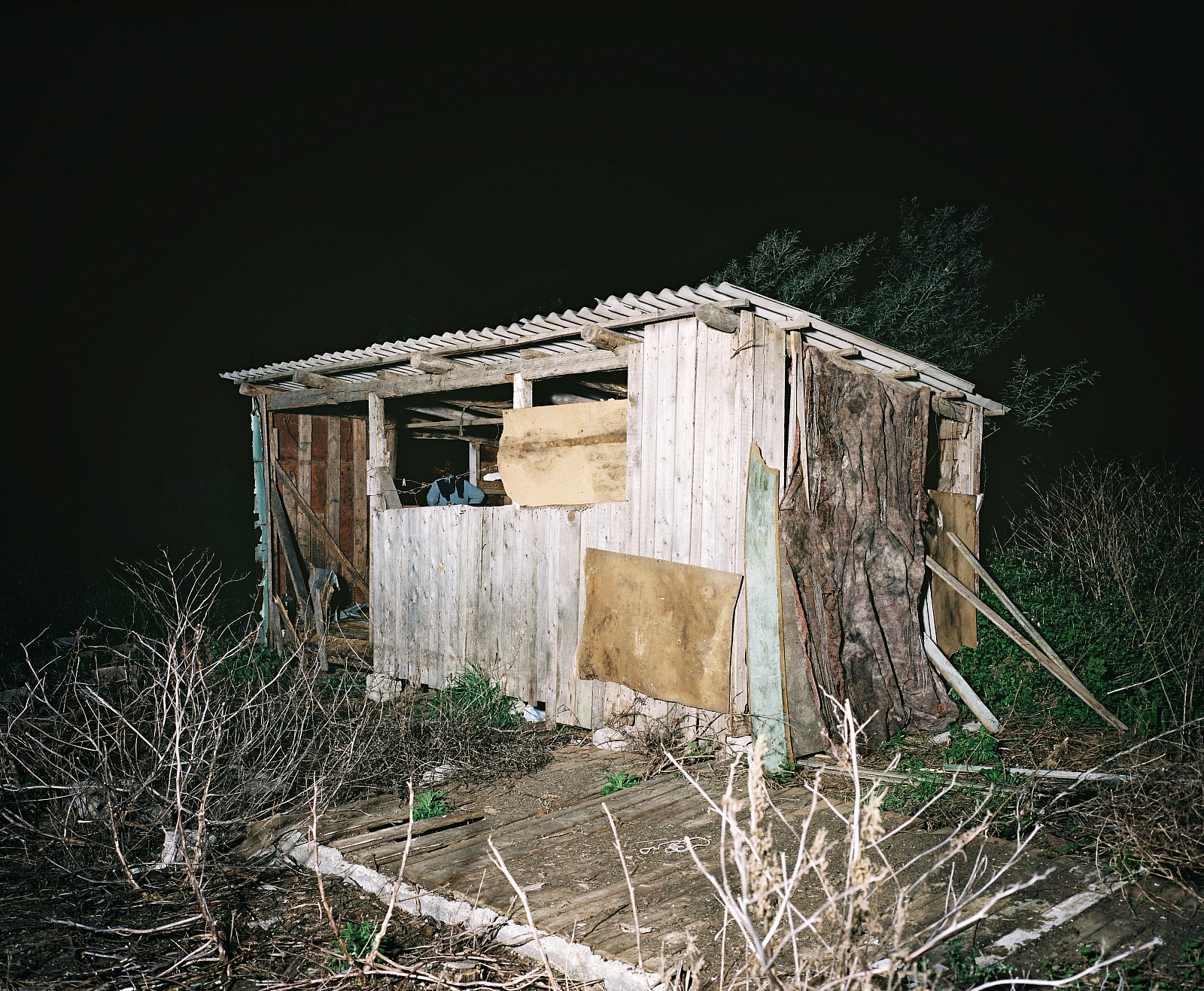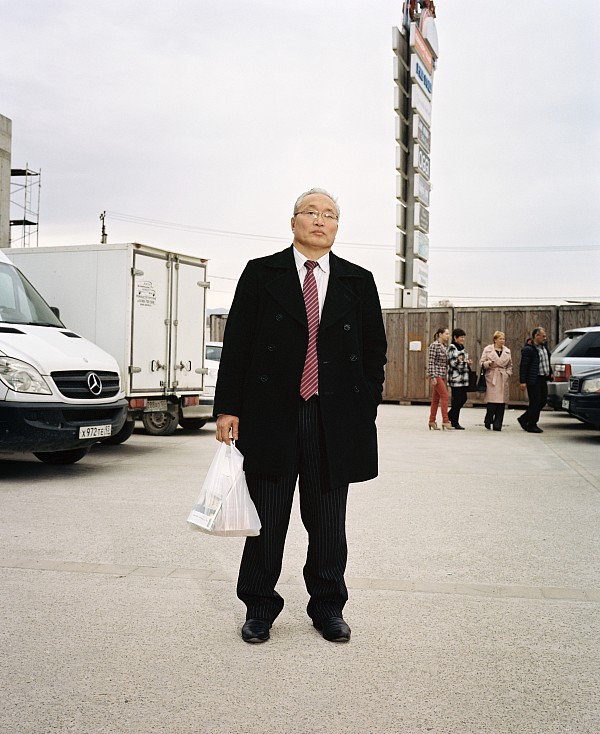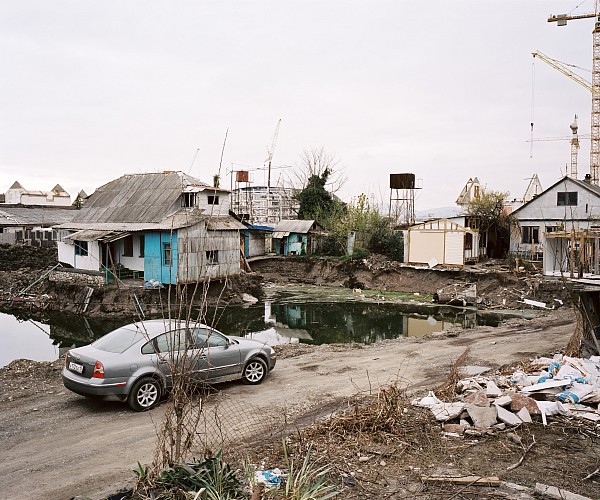Documents
Sovkhoz Russia is a hive of activity. New documents have arrived! “There’s a document in Russia for everything, but we still have to fight for them,” says Tatyana, 55. She lives in one of the many houses that are due to be demolished to make way for the Games. We look at one of the documents. It is a copy of a brochure using overblown language to sell chic Western villas. The map at the back indicates the location of the villas, next to the Olympic stadiums on the seafront – where the sovkhoz now stands. “They’ve already sold our land before they’ve agreed anything with us,” says Tatjana. Her village protested when the IOC visited in 2008, but they were dispersed by police troops. “We heard that if human rights are violated, the IOC can intervene."
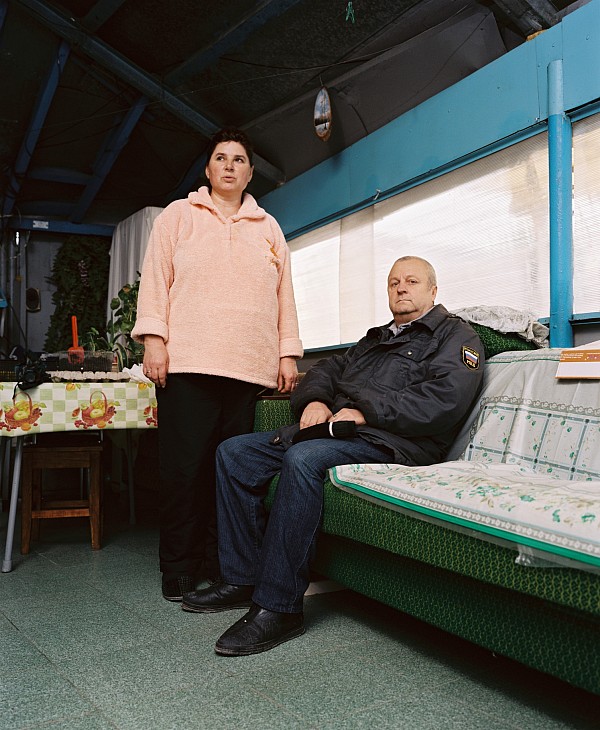
 Anna & Alexander live in a street nearby the future freight harbor. Their house and garden will be demolished. No-one gave them any insight in the way financial compensation or relocation will be arranged. (Adler, Sochi, 2009)
Tatjana
“They didn’t even let us talk to the IOC.”
Anna & Alexander live in a street nearby the future freight harbor. Their house and garden will be demolished. No-one gave them any insight in the way financial compensation or relocation will be arranged. (Adler, Sochi, 2009)
Tatjana
“They didn’t even let us talk to the IOC.”
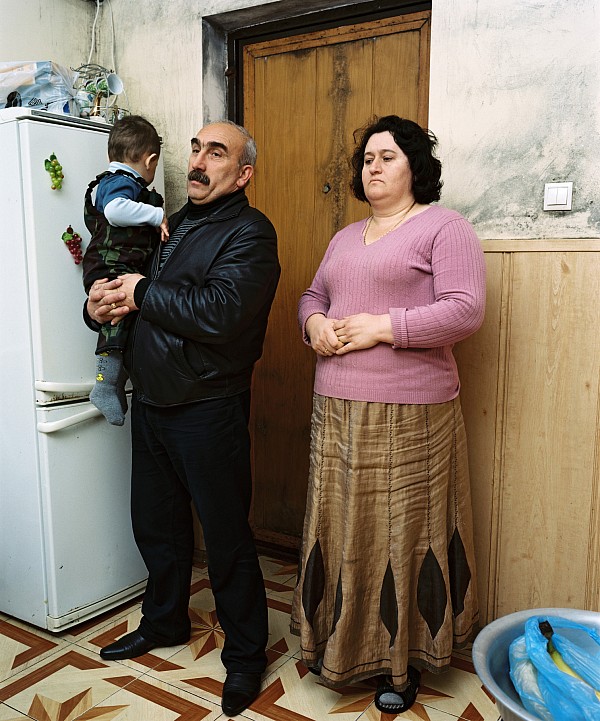
 Manana and Badri have illegally run a hotel, like so many private hotels in this neighbourhood. They won't get any compensation. In a few months, they'll lose everything. (Adler, Sochi, 2009)
Manana and Badri have illegally run a hotel, like so many private hotels in this neighbourhood. They won't get any compensation. In a few months, they'll lose everything. (Adler, Sochi, 2009)
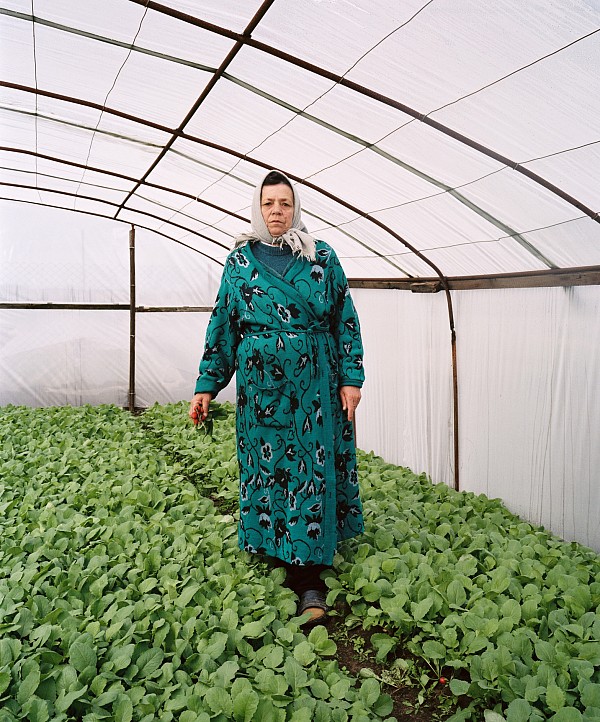
 Tatjana
A tidal wave of theories and conspiracies washes over us.
Tatjana
A tidal wave of theories and conspiracies washes over us.
"But they didn’t even let us talk to the IOC.” A small group quickly forms around the documents and the foreign journalists. A tidal wave of theories and conspiracies washes over us. “Did you know there are large caves and underground lakes below this area, where fresh and saltwater collide? If the stadiums are built here, they'll disappear into the ground immediately,” someone says. Someone else claims to know that the ground is so saturated with water that the eventual building costs will be much higher than ever estimated. A woman points to the rivers that flow out of the mountains. “Have you seen how they’ve been hollowed out? They’re already using the stone for construction in the mountains. But in the meantime, the salmon and trout can no longer use the river.”
A Soviet fairy tale
Ekaterina and Viktor live nearby. Their life reads like a Soviet fairy tale. The couple was asked to come and work here. At the time they were both employed by Russian Railways in Dushanbe, Tajikistan. What is now Stalinabad, Viktor explains. It was convenient for the company that they were both guards and could start work straight away. Viktor had previously worked in Aschabad and Termiez, the warmest places in the former Soviet Union, on the border with Afghanistan. He was born in Bukhara. Ekaterina is originally from Mirgorod, the birthplace of Gogol, in Ukraine, she says with fitting pride. It was shock when they moved from beautiful Ukraine to the arid steppes of Uzbekistan.
They have now lived in Sochi for more than 40 years, in a small house with their daughters Tatiana and Natasha and sons-in-law. Over the years, Viktor has added to the original railway building. The house we are now sitting in, with its crowded kitchen and bedroom, is not a real house, but rather a makeshift summer kitchen. Three families now live in a space of 42 square metres, with a large plot of land surrounded by small sheds and verandas.
Now this house will be demolished.
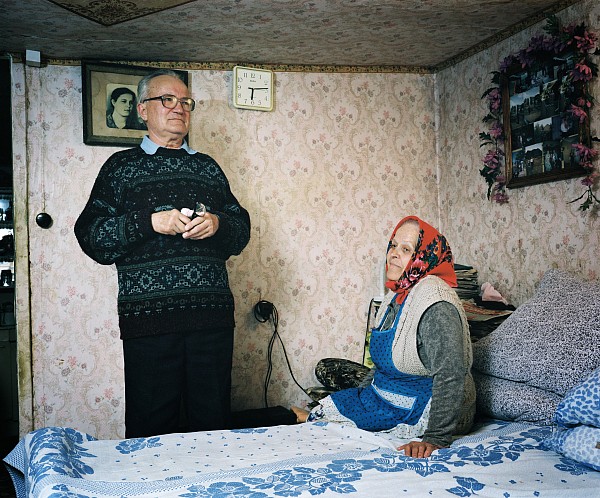
 Ekaterina and Viktor
Ekaterina and Viktor
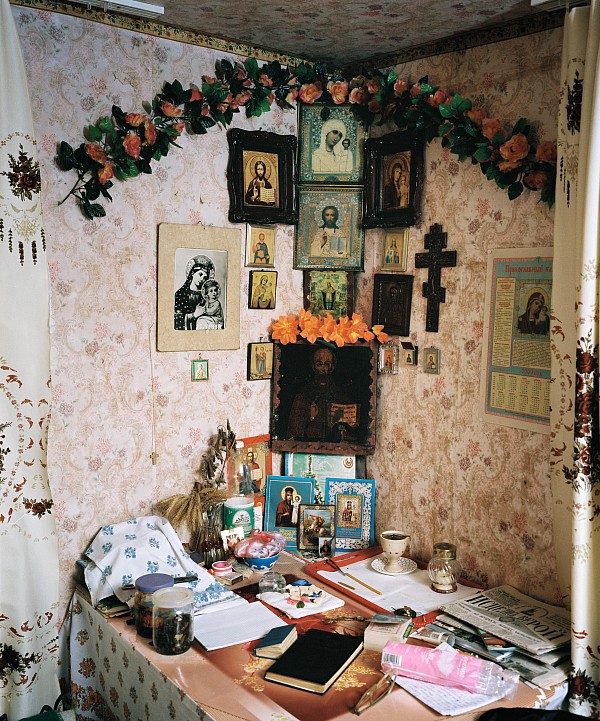
 Altar in the old house.
Altar in the old house.
Now this house will be demolished. An enormous train terminal has already been erected, which is connected to the new deep-sea harbours being built off the coast. The house currently stands in the path of lines that will soon be laid to transport building materials to the Olympic sites in Sochi and Krasnaya Polyana.
The garden is filled with lush palm trees, narcissi and a large patio covered with a grapevine. Small greenhouses supply home-grown vegetables. Chickens and ducks occupy large improvised coops. Behind them is an outhouse that looks out over a cockerel in a cage, four ducks and a tiny pond.
I join Viktor in his shed. We have to bend over to reach the far side of it. He shows me an elaborate collection of jars in boxes, from which he carefully pours three litres of wine into two plastic bottles. One is for us to take with us, one is to consume now. He is clearly in the mood for a drink, because after two glasses his nose has turned red and the stories start to flow.
The law doesn’t apply to the forced relocations in Sochi.
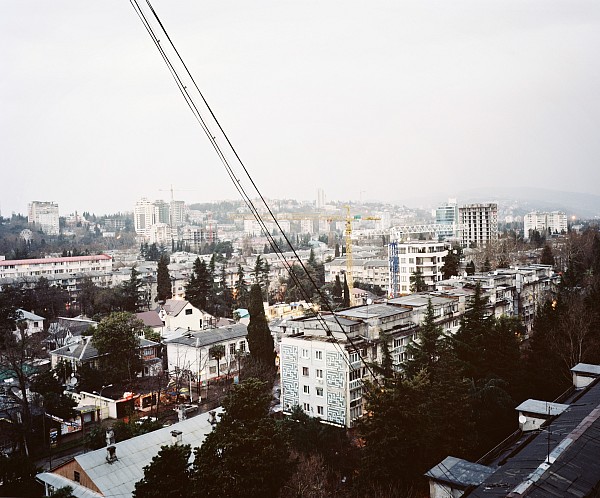
 Central Sochi
Central Sochi
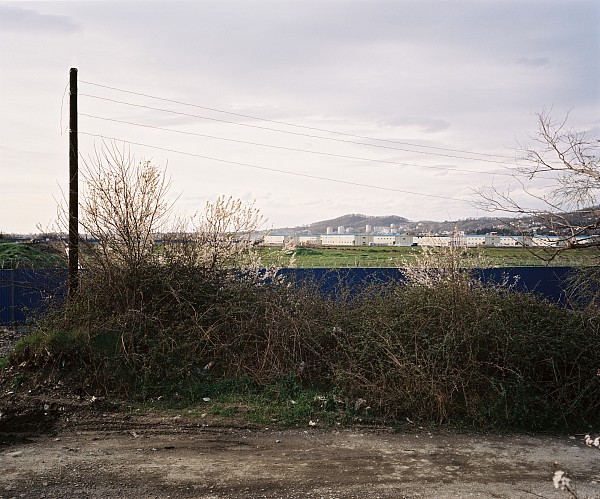
 The dreaded blue 'Olympic' fence near Viktor and Ekaterina.
The dreaded blue 'Olympic' fence near Viktor and Ekaterina.
If they have to move they would like to live in Adler, near their grandchildren. They proudly show us one of their grandson’s volleyball medals. They have already applied for a house, but are embroiled in bureaucracy. As they officially live in a house of 28 square metres, they do not qualify for anything larger. Neither do they qualify for a plot of land, because their current plot is owned by the Railways. Their Belarusian son-in-law is still registered in Belarus, so he is not taken into account. The other son-in-law is still registered as living with his mother in Adler, so he also discounted. "We’re going to wage war," says Viktor proudly. "We aren’t asking for anything special, only a flat to live in. According to federal law, everyone is eligible for a minimum of 18 square metres. Putin always tells us that we should treat old people well, but our mayor says that the law doesn’t apply to the forced relocations in Sochi."
Afraid of the tsar
A few months after we first visit Ekaterina and Viktor in their charming house next to the railway line, we go to see them again, this time in a totally different location: a brand-new apartment complex in the centre of Sochi. Every apartment on this floor is occupied by part of their family. Viktor and Ekaterina’s house is spacious, light and incredibly clean, almost clinically so compared to the previous house they had occupied for 40 years.
In the bedroom, Viktor suddenly bursts into tears. Ekaterina says that he has found it hard to adjust to the city, to the high prices now that they can no longer grow their own vegetables and grapes. And where they used to live now looks awful.
In the bedroom, Viktor suddenly bursts into tears.
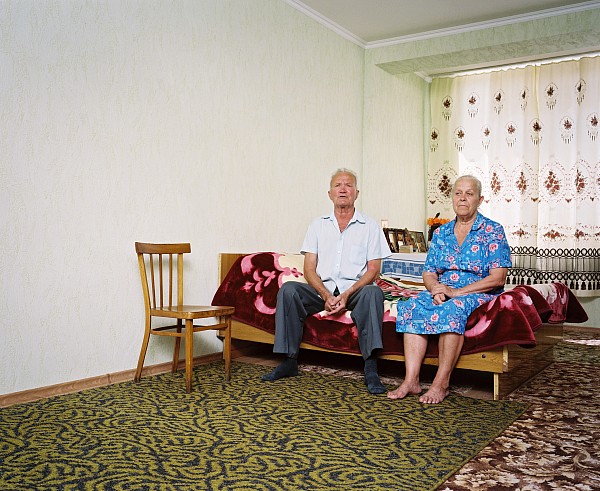
 Ekaterina and Viktor in the new house.
Ekaterina and Viktor in the new house.
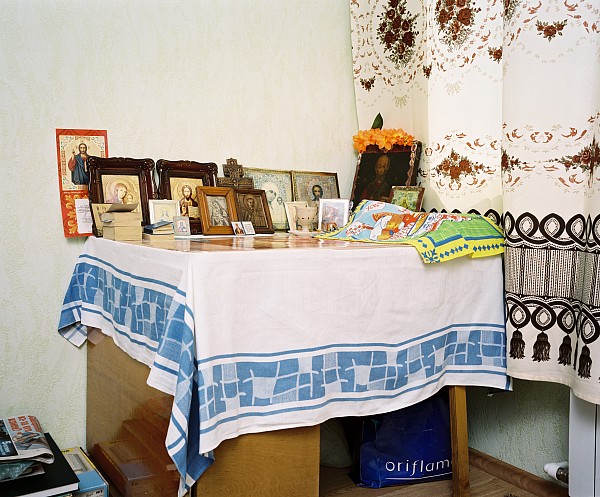
 Altar in the new house.
Altar in the new house.
Viktor had turned his face away from us, but when he recovers he tells us how much he enjoyed our previous visit, how we had drunk wine together and talked about the past. Now that we have come back – sooner than we had said – he was reminded more than ever of his old house.
A bottle of cognac appears, just as the couple had promised the last time. Then, they were looking forward to moving and liked the idea of a comfortable flat in the city. Less than two weeks after our visit, the Olympic machine had been set in motion, Viktor tells a little later at the kitchen table. Representatives from the Railways came to tell them they had 24 hours to pack their belongings and move out.
"We’ve been lucky," says Ekaterina. "Our son-in-law wrote a letter to Prime Minister Putin and President Medvedev. You can do that through their websites, online. Then you’re given a number and they promise that you’ll receive an answer within a week. In April, Putin arrived to check the progress of the building work for the Olympics and suddenly everything with the council and the Railways was taken care of." They were granted a personal meeting with Mayor Pahkomov who promised to find a solution as quickly as possible. He told them that according to a new law everyone who was forced to move would, after all, each get 18 square metres. And he promised, even though it was illegal, to find a solution for the resident daughters and their families.
Victor
"Bureaucrats aren’t afraid of the law, they’re afraid of the tsar."
"Now we live here," Ekaterina continues, "which costs us 2,400 roubles a month [around €55], plus the gas and electricity costs. We have our own heating, something that is controlled centrally in most Russian homes. Normally you work your whole life for a flat like this, which is really for the elite.” Viktor reckons it would cost about €300,000 if you bought it. He speculates that the relocation is sponsored. They moved on a Saturday, and on Sunday Kozak, head of the Olympics in Sochi, came by to check all the documents. They appeared to be the first ones to have moved house in this way, and it attracted wide media coverage. "But imagine," says Viktor, "at least 5,000 people have to move. How are they going to do all that?"
The entire relocation, including transport and manpower, was paid for by the Railways and it had to be completed in record time. Someone ran after the dogs, someone else tried to catch the cats and a neighbour made off with the wine-making equipment. The couple lost a lot of belongings in the packing process, including their supply of preserving jars that mysteriously disappeared. Their stock of homemade wine also dwindled. All the helpers were drunk by the end of the day. Only the ten-litre bottles survived. Putin was due to arrive two days later and the railway lines had to be laid by then.
Bureaucrats aren’t afraid of the law, they’re afraid of the tsar, says Viktor. After the move, the council officials said that if there were any problems at all, they should be contacted immediately. But everything went well.
Falling through the cracks
State television only needs one good example.
Not everyone has had the – relative – luck of Ekaterina and Viktor. State television only needed one good example. In time, almost all the aggrieved wrote to Prime Minister Putin and President Medvedev through their respective websites. The residents around the skating venues had one more success: the cemetery of Old Believers, which in the original plans was due to be demolished, has been allowed to stay. The Old Believers themselves have been given a separate status and accommodated in a new village next to the stadiums. As with numerous other houses, many post-Soviet problems have presented themselves. The inhabitants do not have the original deeds for a particular house or number of occupants. Their private hotels and businesses are in fact illegal, established in the aftermath of the Soviet Union or the turbulent 1990s, giving them no entitlement to compensation.
Each time we visit the Coastal Cluster, more of the streets we saw and the people we encountered have disappeared. Instead, greedy bulldozers and diggers prowl the villages. It is not a unique situation, of course. The same thing happened for the Winter Olympics in Vancouver. Where doesn't it happen? In China, up to a million people were forcibly removed from their homes, in some cases even relocated to other regions. The problem continues to be these people’s lack of rights. But there is no alternative – at least not if you want to build an entire Winter Olympics from scratch in six years.
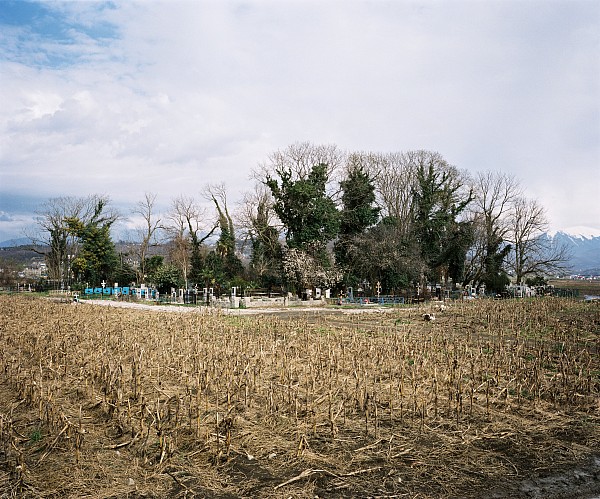
 Cemetery on the Olympic coastal site, photographed in 2009 and 2012. Following numerous protests, the cemetery was spared. It now lies between the ultramodern stadiums, the last tangible reminder of the village that once stood here.
Cemetery on the Olympic coastal site, photographed in 2009 and 2012. Following numerous protests, the cemetery was spared. It now lies between the ultramodern stadiums, the last tangible reminder of the village that once stood here.
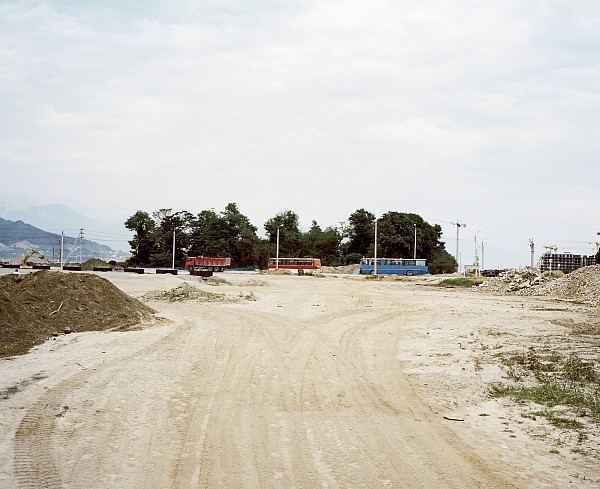

No premature questions
The Russian press has little time for the concerns surrounding the Games. They prefer to report en masse on the successes. One of these early successes is the arrival of the drills for the tunnel to Krasnaya Polyana, the Games’ mountain resort. The drills do not just arrive, Russia’s largest aircraft, the Antonov Ruslan, is commandeered for the job. Of course that’s something we want to see. At 8.30 one morning we report to Sochi’s old airport, which is little more than a glorified bus stop. The new airport is already complete but is only used by Putin, Medvedev and the IOC.
A large horde of TV, radio and newspaper journalists runs nervously back and forth. Once through security we race to the runway where, less than five minutes later, the monster plane bears down on us from the distance. On the ground, presenters fight for the best spots. The plane lands and slowly turns towards the cameras. With a deafening roar it advances, parks and the nose and tail open.
The head of the Railways holds a press conference in front of the open nose. He reels off a list of facts and figures about the plane, the drills and the railway tunnels. When we ask why the people in Imeretinskaya Bay still do not have assurances about replacement housing and land, the press conference is resolutely brought to an end. Neither the cameras nor the railway spokespeople want to cover that issue. Slightly disgruntled, the railway chief stops us. “It’s all going to be fine,” he says. “I don’t understand why you wanted to ask that question.” A reporter with a big microphone from Russian TV says that Russia is always slow off the mark, but knows how to make up lost time. “Imagine you’re woken at three in the morning by people who come to your house and start taking photos of everything. You wouldn’t want that, would you? The Olympics are going to be a great success. The government will make sure of that.”
The Olympics are going to be a great success. The government will make sure of that.
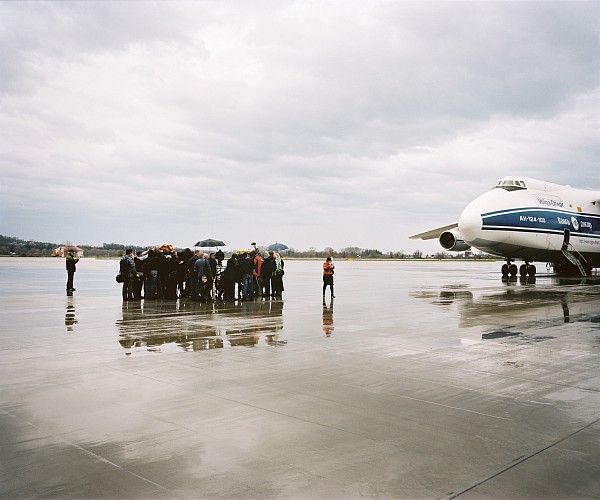

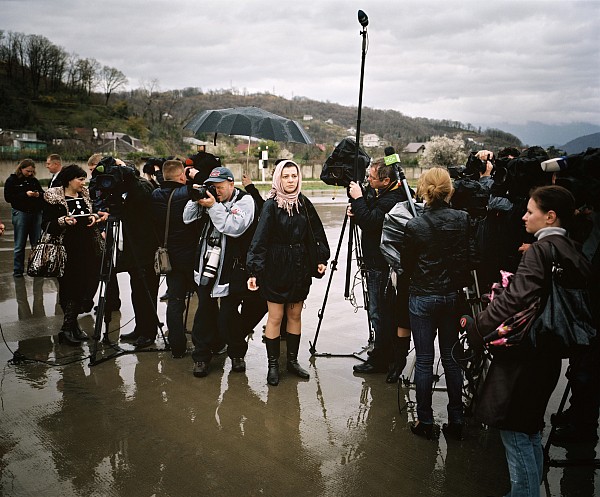

Destructive Games
Alisa Simonovyan
“We’re going to inspire the world.”
In the Olympic Committee’s office in Sochi it is hard not to get caught up in the excitement surrounding ‘the most innovative Games ever’.
“We’re going to inspire the world,” says Alisa Simonovyan from the Information Centre. “This is going to be the first Games where every athlete can get from the Olympic Village to their training location within ten minutes. Imagine how fantastic that is!
Putin’s private project
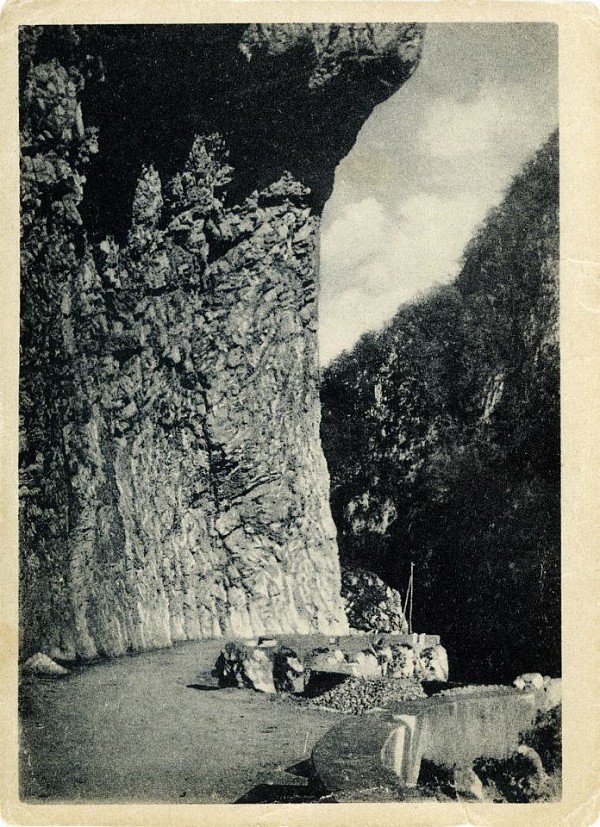
 Postcard of the old road to Krasnaya Polyana.
Postcard of the old road to Krasnaya Polyana.
Vladislav Funtyakov is vice chairman of Sochi’s City Council and a member of Putin’s United Russia party. He holds office in a room crammed with football, ice hockey and Putin paraphernalia. “The biggest surprise for us was probably when Sochi was selected. As representatives of the people we now have to pull out all the stops to make sure this event runs smoothly. We estimate that 150,000 labourers will build the Games and only 400,000 people live here. All those labourers want food, accommodation and culture, but there’s already a housing shortage and a congestion problem. In the ΄90s we were inundated with refugees from the Caucasus. Today, every rich Muscovite wants a flat in Sochi. It’s a small city wedged between the sea and the mountains. It was never meant to a megalopolis. That’s why we have narrow streets and small houses. In addition, many structures are planned in our National Park in the mountains, Sochi’s pride and joy. That’s understandable, because you can’t ski on the beach, but the consequences for the environment are enormous.” He points to a photo of himself in a flower-filled meadow in the mountains. Everyone here is proud of the Caucasus. “We are doing our utmost to limit the impact,” he says, “but what can I do? Sochi 2014 is a federal project. It will be directed from Moscow. My only solace is that it’s Putin’s private project. So it has to work out well, I’m convinced of that.”
Protest in the mountains
The road to Krasnaya Polyana is fantastic, winding past steep gorges, fast-flowing rivers, unspoilt coniferous forests and through impressive tunnels. Krasnaya Polyana, a modest village, is beautifully situated between the steep rising slopes covered with pine trees and snow-capped mountains. In the nearby valley is the complex built by Gazprom, a large hotel with brand-new lifts up to the ski slopes. In the village, Gennadi Kuk, 81, got into the car with us. Sighing and muttering, he observes the destruction to the forests and valleys. Wide roads have been built, the river has been channelled and menacing bulldozers stand ready for yet more work. “My God, that still has to happen to me,” he mutters. Behind his house he undoes his belt, hooks it to a cable and swishes over the swirling river. His land is on the other side and this is the fastest way for him to get there. He has taken up the fight against the local authorities. “I’m a thorn in their side,” he says. He proudly shows us his land, an elevated pasture dotted with burial mounds and the remains of old watch towers. “This is a World Heritage site from the Bronze Age,” he says. “Now a delivery road for the railway is going to be built here. Does your crown prince know about this?” Kuk walks around the burial mounds. His grandfather was once able to acquire this land. “We’ve never disturbed these burial mounds and now they’re going to disappear. It’s not that I’m against these Games. It’s the way in which they are being realised. The inhabitants are supposed to be updated on progress every three months, according to the IOC, but they behave like spies, they don’t show their faces.”
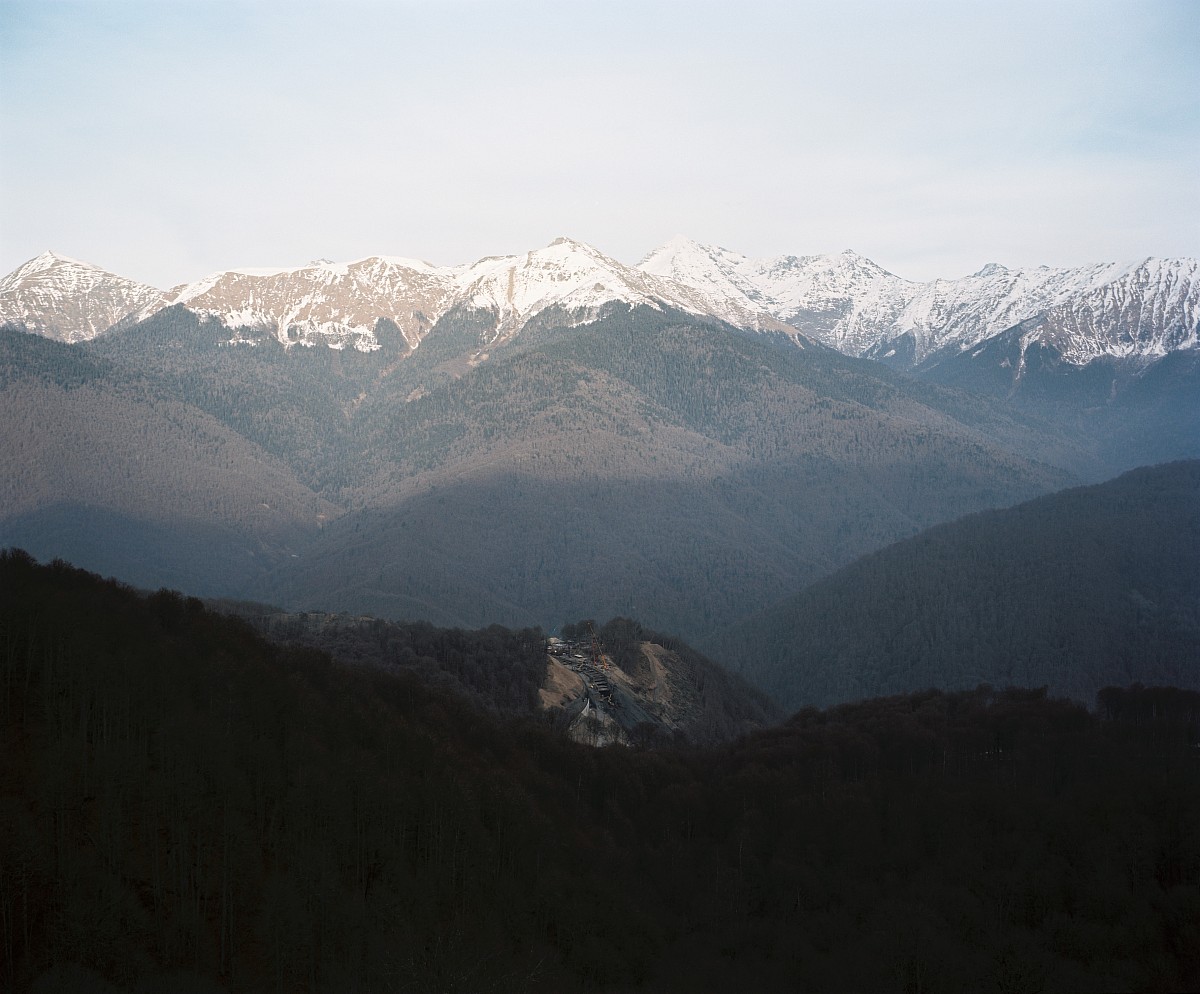
 Mountains of Rosa Khutor
Mountains of Rosa Khutor
Katya Primakova
“I would rather die here than be forced out of my house.”
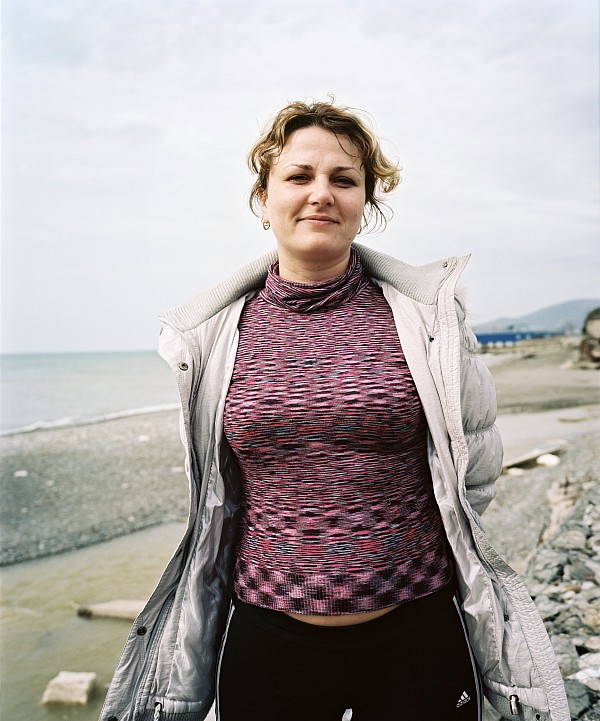
 Katya Primakova, 2009
Katya Primakova, 2009
Full-time activists
The Sochi 2014 email bulletin arrives almost weekly. It is full of news about wonderful covenants. ‘Thanks to Sochi 2014, Russian volunteer culture has been revived’ or ‘Sochi 2014 Organising Committee wants rubbish-free Games’. Katya has to laugh about it. She is 31 and lives with her husband and three children in an extended caravan behind yet another of those high blue fences – invisible to the IOC. In 2002 Katya’s home was threatened by a property developer, but following local protests the inhabitants were able to avoid demolition. This was how Katya found her calling. She started studying law part time. Her neighbourhood could still be demolished – the blue fences can’t stay there forever – but, she says: “I would rather die here than be forced out of my house.”
Devoured by a mountain of rubbish
Katya sells advertising space for the local paper Delovoi Sochi. But for the past few years she has also been an almost full-time activist. Her phone rings all day. Sometimes it is residents who ring to discuss developments, or someone who informs her that new documents have arrived. Katya represents the interests of the people whose houses and land have to make way for the Olympic structures or related amenities. And there are a lot of them.
Anonymous
“Katya! The motherland is calling you!”
The calls often start in the morning: “Katya! The motherland is calling you!” Much is expected of her. A drive through Sochi with Katya reveals a totally different city. She points to houses that are being knocked down, to rivers being channelled and forests that are disappearing for Olympic bypasses and train connections. The culmination of the tour is when she takes us past the tea sovkhoz and has to stop the car for a house that has been pushed into the road. Behind the house is an immense mountain of steaming, stinking rubbish. Andrej Shengarov, 40, sits in a train carriage half buried under the debris. He looks good for someone who lives in a dump. He shows us round the mountain, dotted with black bubbling pools where, astonishingly, frogs survive. He has amassed a large collection of maps and documents. The site does not appear to be known to the land registry, because by law rubbish dumps are forbidden within several kilometres of inhabited areas. “In the ΄90s they wanted to burn the rubbish, but then the factory blew up,” Andrei tells us. “After that they just left it alone.”
One morning two years ago, Andrei was woken by the terrifying sound of rumbling and creaking. He, his wife and children barely had time to get out of the house before it was devoured by an avalanche of rubbish. “It’s possible that the rubbish started to heat up and rot, causing underground shifts,” he theorises. To his surprise, he discovered on one of the maps that an Olympic road is going to be built straight through the middle of the rubbish dump. “I’m curious to see how they’re going to do that,” he says, “but it could be my salvation. In any event it will mean that the rubbish will have to be cleaned up.”
Eco warriors and worriers
There is no meaningful discussion in Sochi between the government, Olympic Organising Committee and groups of concerned citizens.
There is no meaningful discussion in Sochi between the government, Olympic Organising Committee and groups of concerned citizens. Alyk Le is the informal head of one such group, which includes Katya. Alyk Le is the informal head of one such group, which includes Katya. It is a colourful assembly of people who meet weekly, but maintain contact daily; a friendly club of geologists, nature lovers, lawyers, duped or worried inhabitants who, with their beards and woollen jumpers, bear a strong resemblance to a Dutch Peace Council in the ΄70s. Their headquarters are the Geographic Union, a pretty wooden villa in which the former head of Stalin’s personal security detail once resided. They meet there again early one Sunday morning. Alyk Le has natural authority. In a calm voice he speaks on behalf of the group, even though many of those round the table would rather shout their stories from the rooftops. Alyk says that more and more people are talking about decentralisation of the Olympic Games, which would mean that the stadiums would not all be built here but in Moscow, Krasnodar or elsewhere in Russia. “It scares the government that people are talking about this,” he says. “Before we go ahead with our protests and procedures, you have to think carefully about your next of kin and everything you really value."
"Our work can be dangerous – we have to operate with care.” He sums up once again why the Games are irresponsible. “The largest structures are being built on groundwater areas between two big mountain rivers, ski slopes are carving up UNESCO World Heritage sites and thousands of people are being forced to abandon house, hearth and land in exchange for an uncertain future. This is a private project for Putin and a few oligarchs. We’ve complained to the IOC, but never receive any response.”
Alyk Le
"Our work can be dangerous – we have to operate with care.”
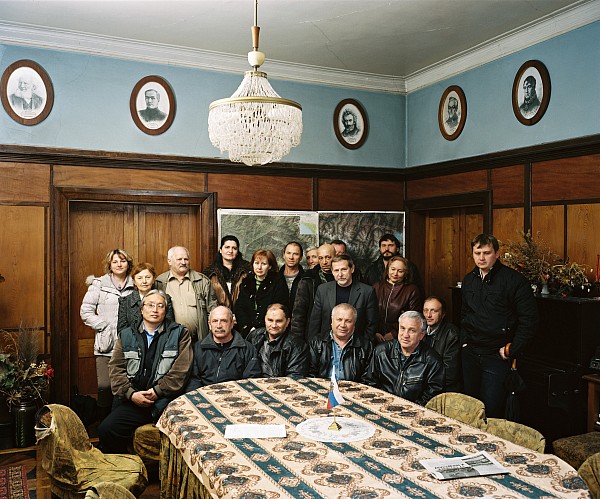
 A fanatical group of activists in Sochi, 2009.
A fanatical group of activists in Sochi, 2009.
The opposition smells its chance
Boris Nemtsov
"The Games must go on.”
One sunny afternoon we have lunch in a Georgian restaurant with former Prime Minister Boris Nemtsov. In an attempt to salvage his career, he has put himself forward as the opposition movement’s candidate for Sochi’s mayoral elections. He likes to talk in witty one-liners. His favourite comparison is that between the Olympic Games and the famous Soviet idea of diverting Siberian rivers to parched Central Asia.
Boris Nemtsov
“The Winter Olympics in 2014 are turning our seaside resort upside down. Literally."
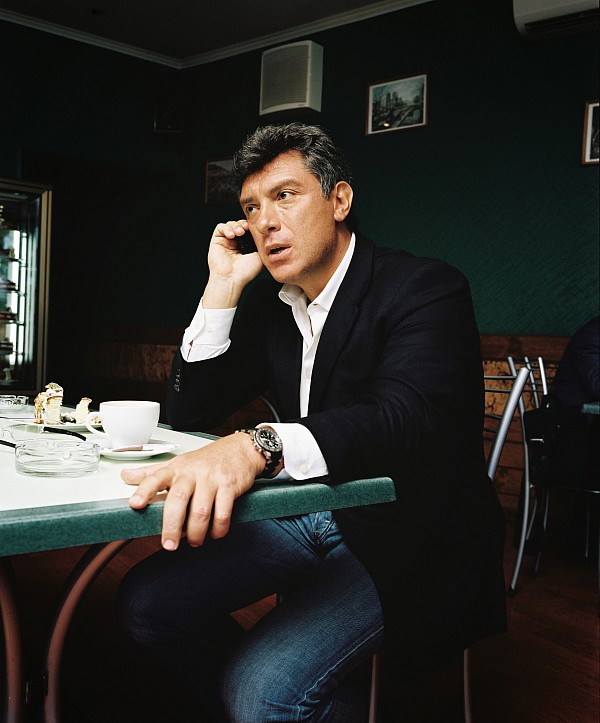
 Boris Nemtsov
Boris Nemtsov
“The Winter Olympics in 2014 are turning our seaside resort upside down. Literally. The summer resort is being turned into a winter destination,” he says. He tucks into a cream pie and then orders a tomato omelette. Nemtsov works with Alyk Le and Katya’s volunteers. “Sochi can become a political experiment. People are working against me, of course, but I hope to make a difference here. Olympics in the subtropics, that’s fraud.” He leans forward: “When Putin wanted to boost his international prestige, he spent hours poring over a map of Russia and chose the only place without snow. He should admit he made a mistake. But has he ever said anything like that before? He wouldn’t be able to get the words out! Now we have to protect Sochi and Russia’s good name. The Games should only go ahead in the mountains. All those stadiums should go to Moscow, Krasnodar, away from here. The Games must go on.”
Nemtsov would – after a few scandals and much opposition from local and national media – suffer a crushing defeat in the elections. Not unexpected in Russia.
Finances
Meanwhile, the construction of the Games continues. Every time we visit Sochi, we join organised Olympic tours. We see the tunnels being drilled, foundations laid, hotels and Olympic Villages taking shape and we attend the Speed Skating World Cup, one of the many test events required to obtain an international stamp of approval for the facilities. The cost of the Games has now exceeded $50 billion, an astonishing difference from the estimated cost of $12 billion. Anyone who considers that those $12 billion made headlines in 2007 – never before had Winter Olympics even come close to being so expensive – can imagine just how astronomical $50 billion is. In any event, these Games are more expensive than the Games in Beijing, China, previously the most expensive ever – despite Winter Olympics being smaller than their summer counterpart.
The Games most costly project, relatively speaking, seems to be the road connecting the skating venues on the coast with the ski resorts in the mountains. The road is 48 kilometres long and has a price tag of 227 billion roubles, almost €6 billion. Russian Esquire magazine published a fantastic visualisation in 2010 that showed the equivalent price of the road in luxury goods such as cognac, caviar and Louis Vuitton bags. The road was built by a company headed by Vladimir Yakunin, president of Russian Railways, who is regarded as one of the main beneficiaries of the Games. He was plagued by stories in the Russian blogosphere (including the website of opposition leader Alexei Navalny) about his many mansions and palaces around the country.
Boris Nemtsov, the opposition politician, calculates that all previous Winter Olympics ultimately cost on average twice as much as initially estimated. $12 billion x 2 = $24 billion, he does the maths for us in what amounts to a beer-mat budget. The other $26 billion – he determines – was syphoned off along the way. Corruption, in other words. Despite the somewhat clumsy arithmetic, it is not an unlikely scenario given Russia's low ranking on the global corruption index (133 out of 176).
Good work
Near Vladimir Sorokin’s helicopter base is Gorki Gorod
 Mountain Cluster
Sochi region
. Arranged symmetrically opposite each other in half and full circles, the hotels, bars, restaurants, stadium, nightclubs and expensive flats of an eclectic village are appearing. The village is one of the showpieces of the Games, but delivery has dragged on and on. In February 2013, this leads to a remarkable spectacle. “So you’re saying that this project is 2.5 years behind schedule?” an onvervroren President Putin asks Dimitry Kozak, Deputy Prime Minister in charge of planning the Olympic Games. Kozak thinks, nods and in a deep voice responds in the affirmative. A tense conversation ensues. “It’s the fault of the previous contractor,” says Kozak, “comrade Bilalov.” “Oh,” says Putin. “Where does he work now?” Akhmed Bilalov does not appear to be an unknown figure, judging by the responses. He is head of a state-owned company building ski resorts in the North Caucasus and deputy head of the Russian Olympic Committee. “And he’s responsible for this project?” Putin asks. “He has some kind of construction company,” says Kozak. “And has the price increased?” “Significantly,” says Kozak. “From 1.2 to 8 billion roubles.” Putin takes to his heels and mumbles cynically, “Good work.” The next day Bilalov is fired.
Mountain Cluster
Sochi region
. Arranged symmetrically opposite each other in half and full circles, the hotels, bars, restaurants, stadium, nightclubs and expensive flats of an eclectic village are appearing. The village is one of the showpieces of the Games, but delivery has dragged on and on. In February 2013, this leads to a remarkable spectacle. “So you’re saying that this project is 2.5 years behind schedule?” an onvervroren President Putin asks Dimitry Kozak, Deputy Prime Minister in charge of planning the Olympic Games. Kozak thinks, nods and in a deep voice responds in the affirmative. A tense conversation ensues. “It’s the fault of the previous contractor,” says Kozak, “comrade Bilalov.” “Oh,” says Putin. “Where does he work now?” Akhmed Bilalov does not appear to be an unknown figure, judging by the responses. He is head of a state-owned company building ski resorts in the North Caucasus and deputy head of the Russian Olympic Committee. “And he’s responsible for this project?” Putin asks. “He has some kind of construction company,” says Kozak. “And has the price increased?” “Significantly,” says Kozak. “From 1.2 to 8 billion roubles.” Putin takes to his heels and mumbles cynically, “Good work.” The next day Bilalov is fired.
Putin takes to his heels and mumbles cynically, “Good work.”
‘Putin inspects games’ door de Russische staatszender Russia Today.
Shortly after, Bilalov and his younger brother – also involved in the Games – flee Russia and release vague reports about mercury poisoning.
Russia’s richest oligarchs are involved in Olympic construction projects. Vladimir Potanin and Oleg Deripaska, who both earned fortunes with the purchase of formerly state-owned enterprises in the early ’90s, in particular are elbow deep in Sochi. It is unlikely, however, that they will make a profit. It is widely believed that they were largely forced into these unprofitable investments to make up for or repay the Russia that they and so many others were able to plunder, generally unhindered, in the ’90s.
The finances are far from transparent.
Those closer to the Kremlin have fared better, such as the aforementioned Yakunin and the Rotenbergs, Putin’s childhood friends, who are expected to earn several billion from the Games. All the reports on the Olympic finances are liberally sprinkled with words like ‘may’ and ‘seem’, because the finances are far from transparent.
Vladimir Sorokin
“There was absolutely nothing here."
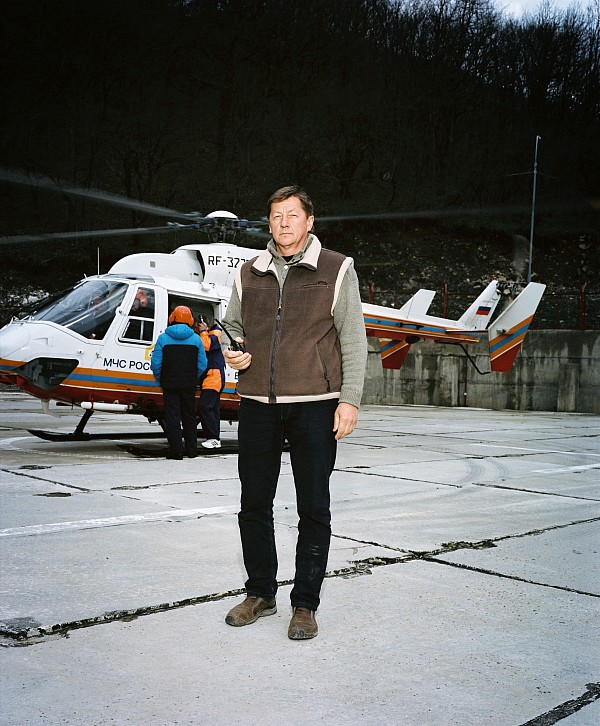
 Vladimir Sorokin, 2013
Vladimir Sorokin, 2013
Obtained through corruption
Vladimir Sorokin walks through Krasnaya Polyana grinning. His village. There comes another helicopter with its characteristic chopper sound. He looks up briefly. His helicopter. A large empty bag hangs from it. “24/7,” he laughs. These are the years of plenty.
Vladimir has lived in Krasnaya Polyana for 25 years. He moved here after finishing college in Riga, Latvia, and became the local ski lift pioneer. “There was absolutely nothing,” he tells us in his office, which looks more like a site hut, with people constantly rushing in and out. He seems to prefer having meetings in his jeep, juggling a mobile and a satellite phone. It all started with heli-skiing. Vladimir brought people from around the world to the Caucasus to ski off-piste. His son grew up with it and plans to be at the start line in 2014, he says proudly. The first ski lifts were only built in the 1990s, and of course it was Vladimir who imported the technology. He is now so uniquely experienced and efficient, he says, that he is being asked to erect lifts around the world. “Others need six helicopters and are at it for weeks; I get by with less and I’m faster,” he grins.
We drive through the village in his jeep. He disapprovingly points out new villas built on the most scenic or strategic spots. He shows us the enormous wooden chalet belonging to the Russian president. In a forested area where construction is officially banned, one villa after another appears.
Vladimir Sorokin
Minister, minister, colonel, member of the Duma, they all live in illegal houses that were obtained through corruption.
“Minister, minister, colonel, member of the Duma…” According to Vladimir, they all live in illegal houses that were obtained through corruption. Some were even built and delivered for free, as a small addendum to a signed contract.
Vladimir effortlessly sums up all the problems with the Games: the weak ground on which the stadiums are being erected and the fact that literally all the infrastructure needs to be built from scratch. He lets it all wash over him; at the end of the day it does not make his life less interesting. He skis with Putin – he recently skied into Abkhazia by mistake, he tells us – and rubs shoulders with Russia’s billionaires and sports stars. It is all a mad adventure for him. “Of course you always worry that it won’t be ready in time for the Games. That’s the same everywhere. But we’ll make sure that everything is ready here.
“Actually,” he continues, “the intention was to bring the Skiing World Cup to Sochi. Under Putin’s influence that suddenly became the Olympic Games. That’s not a problem for us in Krasnaya Polyana; it will only affect Adler and Sochi.” Ultimately, Vladimir does not want to get hung up on the Games. “Everyone knows that they are a mistake. They last two weeks and then fweeet,” he whistles, “they’re gone. Regular Games cost $2.5 billion; ours cost $12.5 billion.” A few years on and the price tag for the Games has soared to $50 billion. “We have to look beyond the Games. How do we make this region interesting in the long term? How do we get tourists to come here in the summer?”
Summer, he says, is essential for the village. “We can live off the forest, that’s how we used to live. You can bring down nine bears during an evening in these forests, there’s that many of them out there. The place is full of fruit, nuts and berries. We can make everything from the forest, even coffee.”
Vladimir Sorokin
“Everyone knows that these Games are a mistake."
Using his own helicopters, he flies the mountain guards, a new security force that is operational here, in and out of the mountains. His pilots, all strapping men, fly in, eight men in military uniforms jump out and almost as quickly the helicopters take off again, flying in reverse almost to the other side of the valley. The ground staff howls with laughter.
Corruption
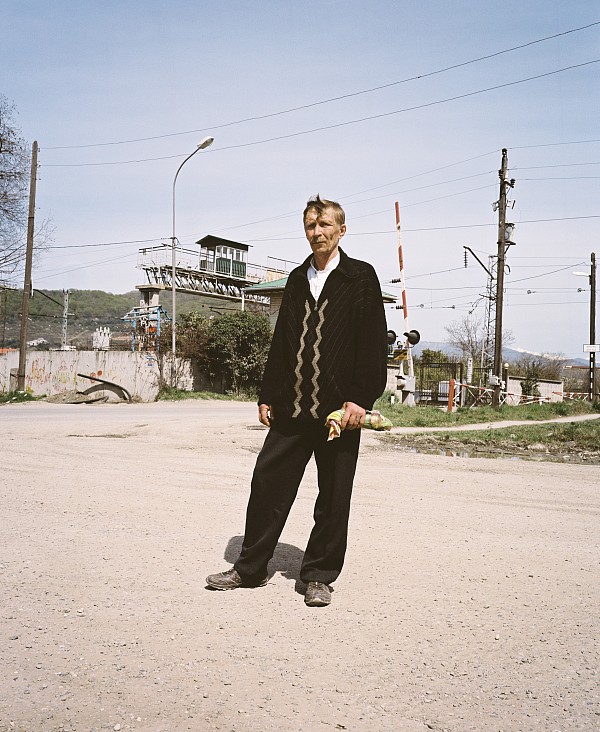
 Ivan Kharchenko from Azov, 2010.
Ivan Kharchenko from Azov, 2010.
A local entrepreneur explains to us how corruption generally works. In Moscow a lucrative contract is put out to tender and is won by a company close to the regime. This company then looks for ways to carry out the work with subcontractors, often Turks, who are cheaper and more efficient. The difference is pocketed by the company. At every link in the chain, from top to bottom, the entrepreneur tells us, money is creamed off in this way.
This system means that on the one hand projects cost significantly more than is actually spent on them. On the other hand, it is clear who is hit the hardest: those at the bottom of the great pyramid of corruption. These people are easy to find around the Olympic site in Sochi. They stand at the side of the road, occasionally holding signs advertising their skills. One of them is Ivan, from Azov. We meet him and fellow labourers Igor and Simyon in mid-2010, shortly after the first major riot on the construction sites. Hundreds of labourers protested about the poor working conditions, non-payment of salaries and their weak negotiating position. Ivan joined the protests. He has not been paid for six months and can no longer afford food and other basic necessities. He has tried to take the matter up with his employer, corporate giant Moskonversprom, but the company denies all responsibility. Moskonversprom has hired various subcontractors, which in turn recruit staff lower down the chain. “Our boss changes every month,” says Ivan. “He receives a certain amount of money from his superiors at Moskonversprom or one of their subcontractors. So it’s completely unclear to us where we should collect our pay. Not at Moskonversprom or the subcontractors, because they’ve outsourced the job again. Our direct boss is given a chunk of money and makes sure that most of it stays in his own pocket.”
Chef of Igor, Ivan and Simyon
"For each one of them, there are ten others waiting to take their place."
This makes it all the more tragic that the three labourers standing by the roadside have not been paid for months. They now sleep in a cowshed on a vacant lot behind their former construction site. They are waiting for a payment of 50,000 roubles (€1,250) for the past months’ work. But the new boss claims that they have already been paid. The attorney general has written them a letter saying that they can strike pending payment of their money. But Igor, Ivan and Simyon are no longer welcome on the construction site.
For each one of them, there are ten others waiting to take their place, says the boss. The men have been eating into their savings for months and can’t afford the journey home. Train travel is expensive. Ivan hasn’t had contact with his family in Azov for weeks. He is embarrassed that he can’t send money. His wife and two daughters will now have to fend for themselves. From his cowshed, he can see the stadiums getting bigger every day.
Human Rights Watch published a report in 2013 about the plight of the labourers, which it says has still not significantly improved.
Olympic Clusters
General map
in Sochi will be completed on time. We have reserved around $12 billion for that purpose," said President Putin at the meeting of the International Olympic Committee in Guatemala in 2007. Up to the spring of 2013 ‘Will it be ready on time?’ was probably the most frequently asked question.
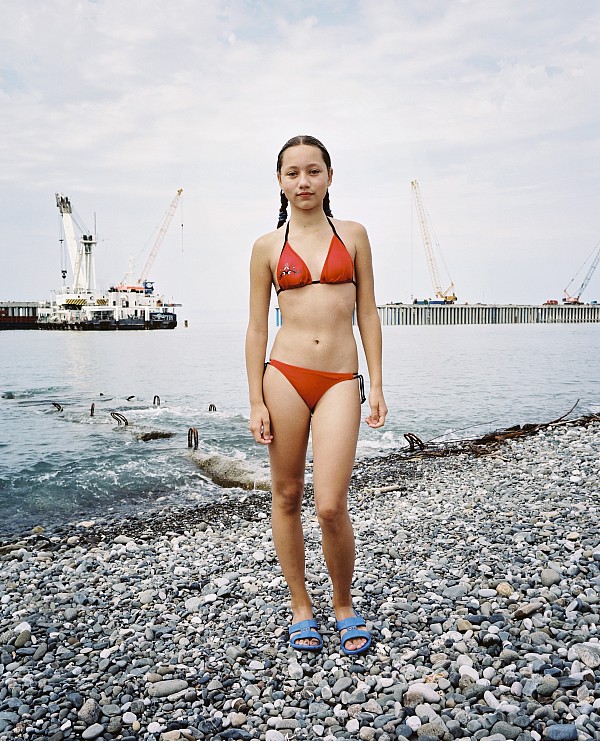
Olga on the beach in front of the yet-to-be-built transport harbour in Adler.
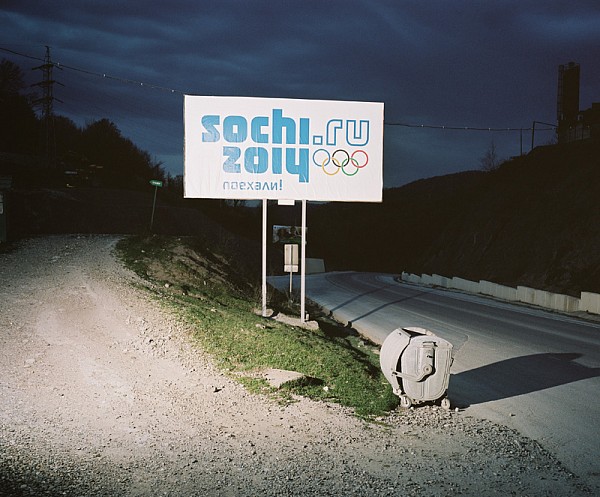
'Sochi 2014 : let's go!' (Krasnaya Polyana, 2010)
